Key takeaways:
- Poetic themes often stem from personal experiences, emotions, and the natural environment, facilitating deep connections with readers.
- Imagery and emotional conflict play crucial roles in enriching poetry themes, helping to convey complex human experiences.
- Cultural influences and societal issues significantly shape poetic expression, fostering a diverse range of perspectives in poetry.
- Nature serves as a profound source of inspiration, prompting themes of growth, resilience, and introspection in writing.
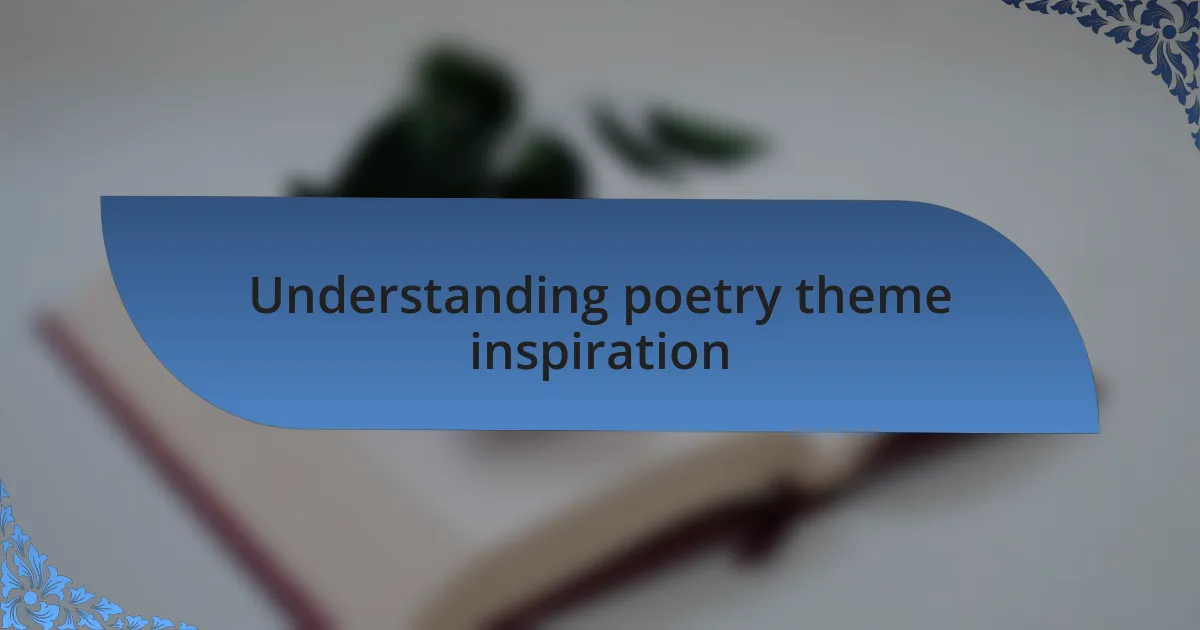
Understanding poetry theme inspiration
Every poem springs from some well of inspiration, often tied to the emotional experiences or observations of life that resonate deeply. I remember one particular rainy afternoon when the weight of the world felt heavier; I found solace in jotting down my thoughts. The transformation of those feelings into words taught me how powerful our shared experiences can be in shaping thematic elements.
It’s fascinating to consider how the environment influences poetic themes. For instance, a simple walk through a bustling city or a quiet forest can ignite thoughts and emotions that seep into your writing. Have you ever noticed how a sunset can evoke feelings of nostalgia? That specific moment can inspire an entire poem, as emotions entwine with the natural world to create a tapestry of meaning.
Themes often reflect universal truths, allowing readers to connect on a profound level. In my own work, I’ve explored love, loss, and hope—each theme a mirror reflecting different aspects of the human condition. What themes do you find yourself returning to in your writing? Digging into these emotions not only enriches my poetry but also fosters a shared understanding among readers, inviting them to explore their own experiences within the verses.
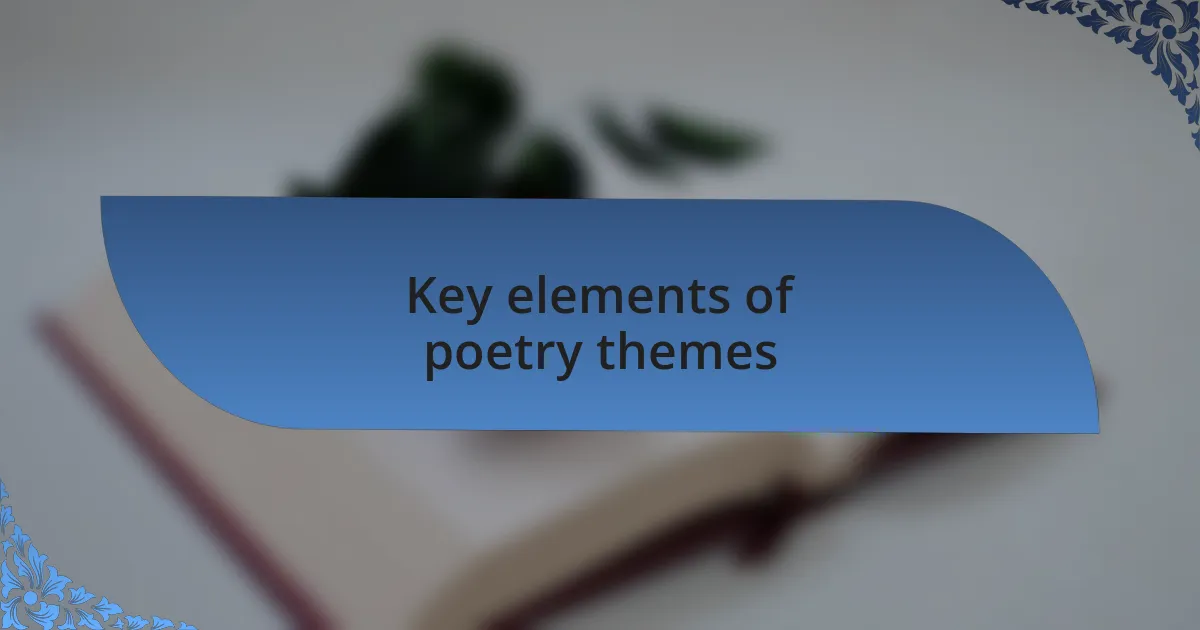
Key elements of poetry themes
One of the key elements of poetry themes is the intricate connection between emotion and imagery. In my journey as a poet, I’ve found that striking visuals can evoke feelings that words alone may not fully capture. For example, I once wrote a poem inspired by the sight of vibrant autumn leaves falling gently to the ground. Each leaf represented a fleeting moment in life, intertwining beauty with the inevitable passage of time. This vivid imagery not only painted a picture but also resonated emotionally, inviting readers to reflect on their own lives.
Another essential aspect is the exploration of conflict within themes. Have you ever experienced a moment of tension that demanded resolution? I recall a personal struggle with identity that surfaced while penning a poem about a fractured family. The clash of voices within those verses symbolized the internal battles we face in seeking acceptance. Such conflict enriches thematic depth, inviting readers to empathize with the turmoil and ultimately find solace in the shared experience of overcoming adversity.
Lastly, the cultural and social contexts surrounding poetry themes cannot be overlooked. As I immerse myself in different cultures, I’ve discovered how diverse backgrounds shape one’s perspective. During my travels, I encountered poetry that resonated with struggles for freedom and justice. Each poem became a window into the collective spirit of its people, reminding me that while our experiences may differ, the themes of hope and resilience can unite us all. What cultural themes inspire your work, and how do they enhance your poetry?
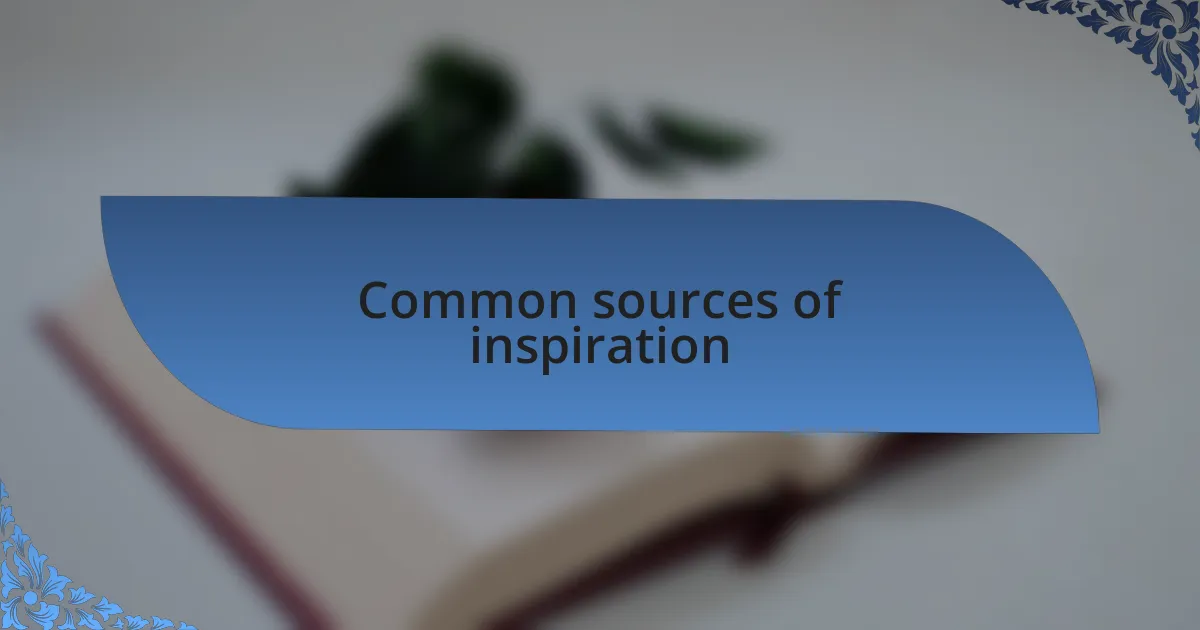
Common sources of inspiration
When I think about common sources of inspiration for poetry, nature often comes to mind. One brisk morning, while walking through a frost-covered field, I felt a surge of creativity as the sunlight broke over the horizon. It made me wonder—how does the natural world shape your thoughts and feelings? For me, that moment sparked a flurry of words about renewal and the quiet strength found within stillness.
Personal experiences are another deep well of inspiration. Recall a moment of heartbreak or joy; those emotional peaks often fuel my writing. I remember a time when I penned verses after a nostalgic visit to my childhood home. Each room held memories that intertwined with my present, igniting a reflection on growth and change. It’s interesting to think—how do our past experiences mold our poetic voice?
Lastly, societal issues serve as powerful muses. I often find myself moved by the struggles and triumphs of those around me. A powerful conversation with a friend about social injustice led me to create a poem that mirrored their pain, but also celebrated their resilience. In those moments, I realize the importance of using poetry as a platform for voices that need to be heard. What societal themes resonate within your writing? How do they compel you to craft meaningful verses?
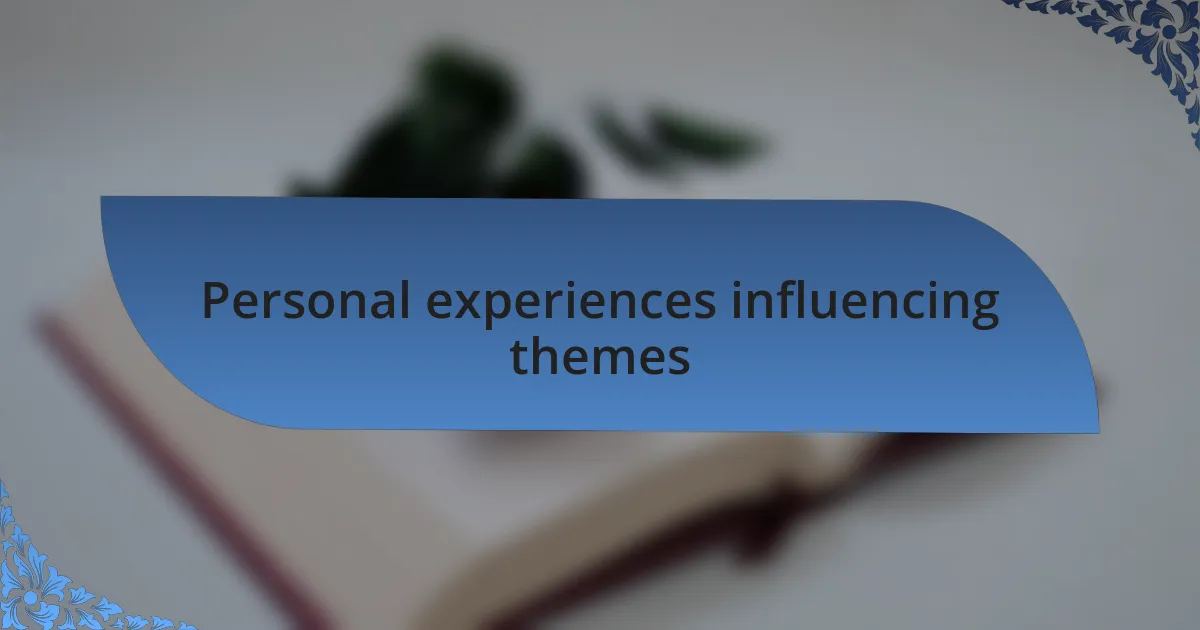
Personal experiences influencing themes
Reflecting on personal experiences, I often find that my themes emerge from the most unexpected moments. For instance, I once wrote a poem during a quiet evening spent with a friend who was struggling with anxiety. As we shared our fears and dreams over a cup of tea, I felt a profound connection that inspired verses about vulnerability and companionship. Have you ever stopped to consider how those intimate conversations shape your writing?
I’ve also discovered that travel tends to unlock powerful themes in my poetry. After a solo trip to a bustling city, I was flooded with impressions of cultural contrasts and human stories. Wandering the streets, I met a homeless artist who shared his dreams with me, and those fleeting encounters often translate into verses that reflect both the struggles and hopes we encounter on our journeys. Can the place you visit influence the stories you tell?
Sometimes, the themes developed from personal loss lead me down the most transformative paths. After losing a beloved pet, I felt an overwhelming cloud of grief—not just for my furry companion but for all connections that fade away. This pain propelled me to write a series of poems that explored the bittersweet nature of love and farewell. How do these feelings of loss resonate in your own work, and what lessons do they impart?
Nature’s role in shaping themes
Nature has always been a profound source of inspiration for my poetry, often nudging me toward themes of growth and renewal. I recall a hike in a lush forest, where the dappled sunlight filtered through the trees, illuminating everything in its path. I couldn’t help but think about how nature’s cycles mirror our own journeys—how each season brings both beauty and change. Have you ever noticed how a single moment in nature can spark an entire poem?
On another occasion, while standing by the ocean, I was struck by the power and serenity of the waves crashing against the shore. The rhythm of the sea seemed to echo the ebb and flow of emotions within us. It made me reflect on themes of resilience, as each wave, no matter how tumultuous, eventually retreats back, allowing the beach to breathe. It raised a question: can the vastness of nature provide solace for your innermost struggles?
I find that the stillness of a mountain sunset often leads to themes of introspection and solitude in my writing. One evening, perched on a rocky ledge, the colors of the sky transitioned from fiery orange to deep indigo, prompting me to ponder life’s fleeting moments. This contemplative experience transformed into verses that expressed the beauty of stillness and the importance of pausing to reflect. How often do you allow nature’s stillness to inspire your own insights?
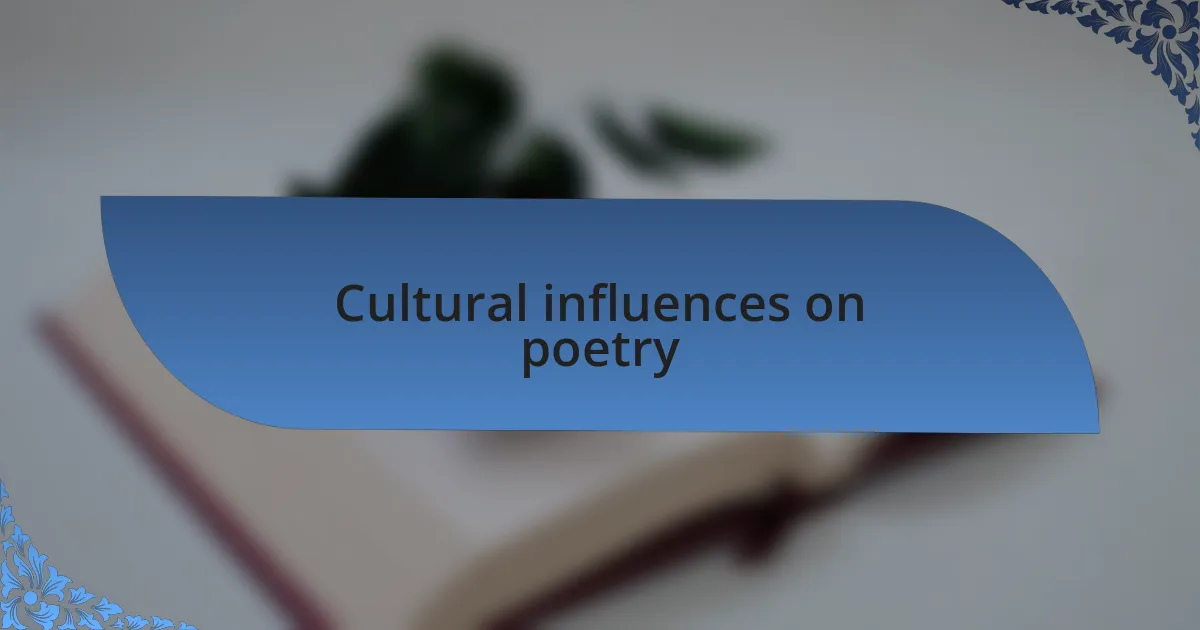
Cultural influences on poetry
Cultural influences shape poetry in profound ways, often coloring themes and perspectives with rich tapestries of tradition and heritage. I remember attending a local festival celebrating the rich tapestry of our community’s diverse backgrounds. Each poet revealed their unique voice, reflecting their cultural narratives, and it struck me how those stories, brimming with history and emotion, resonated deeply within us all. Have you ever experienced how a different culture’s expression can evoke feelings you never knew existed?
In one of my workshops, we explored the power of folklore and myth as catalysts for poetic expression. I shared a poem inspired by an ancient tale from my culture, which brought the room to life as others connected their own backgrounds to the themes of fate and destiny. It was a reminder that our cultural stories often serve as mirrors, allowing us to examine our shared human experience through the lens of tradition. How does your cultural narrative influence the stories you yearn to tell?
Reflecting on globalization, I find that cross-cultural exchanges generate a vibrant collage of themes in contemporary poetry. I once collaborated with a poet from a completely different part of the world, and the melding of our influences expanded my creative outlook significantly. We dared to explore themes like identity and belonging, weaving our distinct backgrounds into a unified narrative. Isn’t it fascinating how stepping outside our familiar cultural boundaries can enrich our poetry and broaden our understanding of each other?
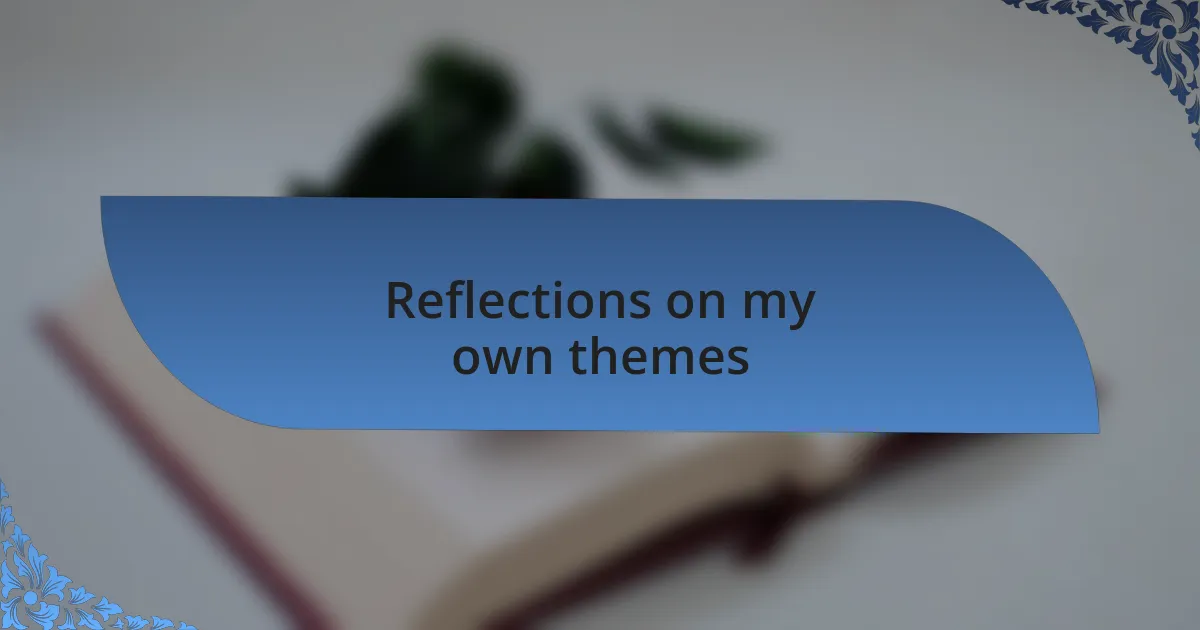
Reflections on my own themes
In reflecting on my own themes, I often realize how my personal experiences intertwine with the universal emotions of love, loss, and hope. For instance, during a particularly challenging period in my life, I turned to writing as a means of therapy. The raw emotion of that time seeped into my poetry, allowing me to explore resilience and vulnerability. Have you found that your own struggles lead to the most impactful writing?
As I delve deeper into my themes, I recognize the significance of nature’s influence on my work. I recall a solitary walk in the woods where the interplay of light and shadow inspired a vivid poem. The experience became a metaphor for the complexities of life, illustrating how beauty often coexists with darkness. Isn’t it intriguing how the simplest moments can spark profound insights?
Moreover, the theme of identity continues to resonate with me as I navigate my place in the world. I’ve often drawn from my multicultural background, allowing it to shape my poetic voice. During a discussion in a poetry group, I shared my journey of self-discovery, revealing how my heritage informs my writing. How often do we pause to consider the layers of identity that influence our creative expression?